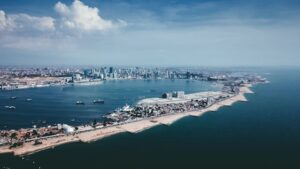Angola is repositioning itself as one of Southern Africa’s most strategically significant economies for foreign and offshore investors.
Once narrowly defined by its oil wealth and political opacity, the country has undergone a series of structural reforms aimed at stabilizing its macroeconomic environment, improving financial oversight, and attracting compliant, long-term capital.
For offshore investors, Angola is not a tax haven but a gateway: a legally structured, compliance-focused platform for exposure to Southern Africa’s high-growth sectors, with the added advantage of an improving regulatory and financial environment.
My contact details are hello@adamfayed.com and WhatsApp +44-7393-450-837 if you have any questions.
The information in this article is for general guidance only. It does not constitute financial, legal, or tax advice, and is not a recommendation or solicitation to invest. Some facts may have changed since the time of writing.

Offshore Investments in Angola
Unlike traditional offshore jurisdictions that compete on tax incentives, Angola’s value lies in its regulatory credibility and geographic positioning.
Its investment regime is built around formal registration under the Private Investment Law (PIL), with oversight from the National Bank of Angola (BNA) and the national investment agency AIPEX.
This shift offers high-net-worth individuals (HNWIs) and expatriate investors a level of legal certainty unusual in the region, coupled with direct access to frontier-market opportunities in energy, critical minerals, infrastructure, and agribusiness.
Recent developments underscore this transformation. Angola’s exit from OPEC in December 2023 allowed the government to pursue more flexible oil production policies to stabilize revenues.
Its completion of IMF-supported structural reforms and the resulting sovereign credit rating upgrades have strengthened investor confidence.
In parallel, Angola’s pivot toward the U.S.-backed Lobito Corridor infrastructure project and diversification into mining and agriculture signal a deliberate attempt to integrate into global trade and capital flows.
What are the key sectors attracting offshore investors in Angola?
Angola’s economy is in the midst of a transition. Oil remains its largest revenue source, accounting for roughly one-third of GDP and over 90% of export earnings, but the government has made diversification a central policy objective.
The completion of its IMF reform program in 2021 laid the groundwork for fiscal stabilization, tighter monetary policy under the BNA, and a gradual reduction in subsidies that had historically distorted the economy.
These measures, while politically challenging, have aligned Angola’s financial governance more closely with international standards.
What are the opportunities for offshore investment in Angola?
Angola’s investment potential is concentrated in a handful of high-value sectors aligned with the government’s diversification and industrialization strategy.
These sectors are not only resource-driven but also supported by regulatory incentives under the Private Investment Law, particularly when investments are routed through AIPEX’s priority regime.
Oil and Gas
Oil remains the backbone of Angola’s economy, with offshore production in the Lower Congo and Kwanza basins attracting major international operators such as TotalEnergies, ExxonMobil, Chevron, and BP.
Angola’s withdrawal from OPEC in December 2023 has given the government greater autonomy in production decisions, reducing compliance-related constraints and enabling investment-friendly licensing rounds.
While mature offshore fields are in decline, new deepwater and ultra-deepwater projects are under development.
Concurrently, the government is investing in downstream infrastructure, including refinery projects in Cabinda, Soyo, and Lobito, aimed at reducing Angola’s reliance on fuel imports and stabilizing domestic supply.
For investors, this presents opportunities not only in exploration and production but also in refining, services, and midstream logistics linked to the oil economy.
Mining and Critical Minerals
Angola is emerging as a strategic supplier of diamonds and critical minerals. The Luele diamond mine, commissioned in late 2023, is one of the largest known diamond deposits globally, with an estimated 628 million carats in reserves. This project is expected to make Angola a top-three global producer.
Beyond diamonds, Angola is prioritizing exploration of rare earth elements, copper, and lithium, aligning with global demand for electric vehicle and battery supply chains.
The government has also streamlined mining licensing processes under the Ministry of Mineral Resources, Petroleum, and Gas, with an emphasis on transparency and partnership with foreign investors.
Infrastructure and Trade Corridors
The Lobito Corridor is the flagship infrastructure project anchoring Angola’s regional integration. The $10 billion project connects the mineral-rich Copperbelt of the DRC and Zambia to the Port of Lobito, offering a shorter, more efficient export route to global markets.
Backed by the U.S., EU, and private operators through the Lobito Atlantic Railway consortium, the corridor is expected to drive demand for associated infrastructure like warehousing, industrial parks, and logistics hubs, positioning Angola as a regional trade and transport hub.
Refining and Industrial Processing
Angola’s industrial policy seeks to capture more value domestically through refining and processing.
This includes not only oil refineries but also diamond cutting, mineral processing plants, and manufacturing facilities linked to the country’s resource base.
By moving up the value chain, the government aims to reduce its dependence on raw commodity exports and create a more diversified industrial base for foreign investment participation.
Emerging Agriculture and Services
With over 35 million hectares of arable land and only a fraction currently under cultivation, agriculture represents a long-term diversification play.
The government is offering incentives for investment in mechanized farming, irrigation, and food processing to reduce import dependence.
Services tied to logistics, finance, and energy are also growing, fueled by the broader economic reforms and foreign investment inflows.
Angola Regulations and Compliance
Angola’s regulatory framework has been overhauled to create a formalized, transparent environment for foreign investment.
Central to this is the Private Investment Law (Law No. 10/18), which replaced the 2015 law and established a streamlined process for project registration, approval, and access to fiscal benefits.
Key Regulatory Components

- Private Investment Law (PIL): Eliminated the mandatory local partnership requirement for most sectors and introduced automatic incentives for projects in designated priority sectors. Investors benefit from customs exemptions, tax reductions, and guarantees for profit repatriation.
- AIPEX (Agência de Investimento Privado e Promoção das Exportações): AIPEX serves as the one-stop shop for investment registration. Investors must submit a detailed project dossier, including financing, workforce plans, and sector alignment. Successful registration results in a Private Investment Registration Certificate (CRIP), granting access to incentives and legal protections.
- Exchange Control and Currency Rules: The National Bank of Angola (BNA) oversees foreign currency transactions. Approved investment projects can open foreign currency accounts in Angola and repatriate profits, subject to documented compliance.
- International Compliance Alignment: Angola enforces anti-money laundering (AML) and counter-terrorist financing (CTF) rules aligned with Financial Action Task Force (FATF) standards. It has also adopted the Common Reporting Standard (CRS) for automatic exchange of financial account information.
- Ownership Restrictions: Certain sectors such as oil and gas, financial services, and utilities retain limitations on foreign ownership or require joint ventures with state-owned entities or approved local partners.
These measures have created a regulated but functional environment that prioritizes compliance over low-tax arbitrage.
For high-net-worth individuals and offshore investors, the result is a jurisdiction that offers both legal certainty and sector-specific incentives while mitigating the reputational risk associated with traditional tax havens.
Advantages of Angola for Offshore Investors
For HNWIs and expats, the appeal of Angola lies not in secrecy but in its potential to serve as a compliant, growth-oriented bridge between global capital and Africa’s emerging economic corridors.
- Legal Certainty Through Structured Registration:
Investments registered under the Private Investment Law (PIL) and processed through AIPEX provide investors with formal legal protections, including guarantees on profit repatriation, access to dispute resolution mechanisms, and enforceable contractual rights. This framework offers the compliance visibility required by family offices, institutional investors, and regulated offshore wealth managers. - Foreign Currency Accounts for Offshore-Linked Investments:
The National Bank of Angola (BNA) permits investors to open foreign currency accounts tied to approved investment projects. This allows HNWIs to ring-fence capital for Angola-related ventures while maintaining clear segregation between onshore and offshore wealth structures. - Regional Positioning:
Angola’s location, combined with infrastructure projects such as the Lobito Corridor, provides access to the broader Southern African market. For investors seeking exposure to high-growth frontier economies like the Democratic Republic of Congo and Zambia, Angola offers a natural operational base. - Synergy Between Offshore Wealth and Local Investment:
Angola’s alignment with international compliance regimes (AML, CRS) enables offshore wealth managers to structure Angola-linked investments within regulated multi-jurisdictional portfolios. This compatibility reduces the risk of regulatory scrutiny while facilitating integration with traditional offshore hubs such as Mauritius or the UAE for tax-efficient structuring.
Angola Challenges and Risks
- Political and Governance Risk
Despite anti-corruption measures implemented under President João Lourenço, Angola continues to face governance challenges. Specifically their anti-money laundering (AML) and counter-terrorist financing (CFT) troubles still place the country in the global FTAF grey list. Bureaucracy, opaque decision-making in state-linked sectors, and the legacy of entrenched political networks can complicate deal execution and prolong regulatory approvals. - Commodity Dependence
Angola’s economy remains highly exposed to global commodity price volatility, particularly oil. Although diversification efforts are underway, oil revenues continue to dominate fiscal performance and foreign exchange availability. Sharp declines in energy prices can affect liquidity in the financial system and delay payments to suppliers and contractors. - Administrative Bottlenecks
Investment onboarding in Angola is slower compared to traditional offshore jurisdictions. Registration through AIPEX, currency approvals from the BNA, and compliance with sector-specific regulations require detailed documentation and the involvement of local legal and advisory firms. While these processes ensure compliance, they add time and cost to market entry. - Limited Tax Incentives
Unlike offshore centers in Mauritius or the British Virgin Islands, Angola does not offer blanket tax exemptions. Instead, incentives are sector-specific and tied to registered projects. While this enhances legal credibility, it also means that Angola is not suitable for investors seeking purely tax-driven strategies. - Market Volatility and Execution Risk
Angola’s frontier-market status means infrastructure gaps, underdeveloped financial markets, and currency volatility remain operational realities.
Mitigating these risks requires thorough due diligence, political risk insurance, and often, a hybrid investment structure pairing Angola with more established financial hubs.
Despite these challenges, Angola’s trajectory favors investors who value early-mover positioning in a market that is actively reforming.
For those prepared to navigate its compliance-heavy environment, the country offers a high-risk, high-reward entry point into Africa’s next wave of growth.
Pained by financial indecision?

Adam is an internationally recognised author on financial matters with over 830million answer views on Quora, a widely sold book on Amazon, and a contributor on Forbes.



